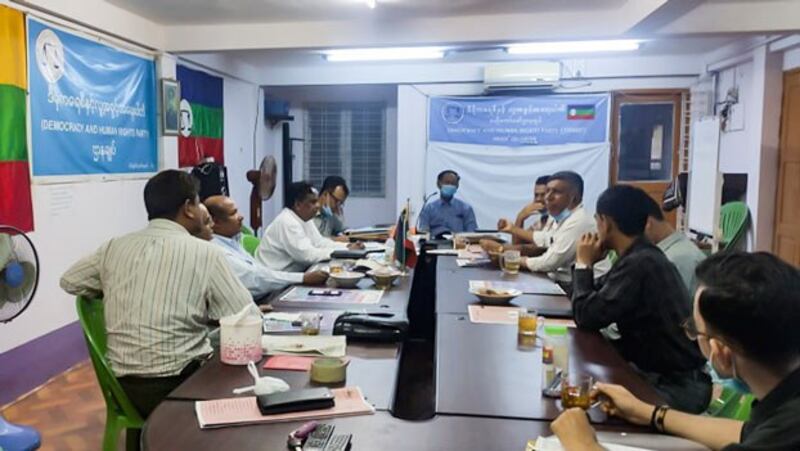A Rohingya man who filed to run for a seat in Myanmar’s parliament in November has been disqualified over questions about his parents’ citizenship, a decision that he disputed and that activists say underscores pervasive official discrimination toward the Muslim minority.
Abdul Rasheed, a member of the Rohingya-led Democracy and Human Rights Party (DHRP), filed his candidate application to run for a parliamentary seat representing Sittwe township in western Rakhine state, home to most of Myanmar’s 300,000 Rohingya.
On Tuesday, six days after he filed his papers at the Sittwe District Election Commission, election authorities rejected his application on the grounds that his parents were not Myanmar citizens when he was born.
The 58-year-old said his father was a civil servant for nearly four decades in Rakhine’s capital Sittwe and received a government pension. His mother, meanwhile, holds a citizenship certificate.
“It is obvious that my mother became a citizen before I was born because she has a three-fold national ID card,” Abdul Rasheed told RFA on Thursday, referring to National Registration Cards (NRC) issued by the government from 1948 to 1982, and which provided full citizenship rights.
In 1982, Myanmar enacted a Citizenship Law that decreed that only members of the “national races” seen as having settled in Myanmar prior to beginning of British colonial rule in 1824 were entitled to citizenship. The Rohingya were not included among the 135 official ethnic groups and were suddenly excluded from full citizenship and disenfranchised.
Election authorities told Abdul Rasheed that they accepted his account, but did not have the authority to verify his parent’s citizenship. They also said he could file an appeal over the application rejection, which he said he would do.
Abdul Rasheed questioned why other ethnic groups who hold three-fold ID cards are recognized as citizens.
“People have asked me if my candidacy was rejected because I am a Muslim or a Rohingya,” he said.
“I’m disappointed that other people who hold the same types of ID cards are allowed to be candidates,” he said. “Their citizenship is not being questioned. Why is my citizenship as a Muslim or a Rohingya being questioned?”
More than a dozen other Rohingya candidates have submitted candidate registration forms to run in the upcoming elections.
Abdul Rasheed was also rejected when he tried to register as a parliamentary candidate for Sittwe in the 2015 general elections, which brought to power current Myanmar leader Aung San Suu Kyi and her National League for Democracy (NLD) government. State election authorities later threw out his appeal.

‘Linked to genocidal policy’
The international community has condemned Aung San Suu Kyi’s government over its handling of the military’s brutal crackdown on Rohingya communities in northern Rakhine state nearly three years ago that left thousands dead and prompted more than 740,000 to flee to neighboring Bangladesh.
Myanmar faces charges on genocide-related charges at the International Criminal Court for the maltreatment of the Rohingya during the crackdown — accusations that Aung San Suu Kyi and the military have denied.
Rohingya activist Wai Wai Nu, whose father chairs the DHRP, said Abdul Raheed’s disqualification by election authorities reflects the government’s attitude toward the Rohingya.
"This is actually directly linked to the state's genocidal policy against our people,"
she said Thursday during a webinar on the Rohingya crisis.
“Despite a long history of participation in Burma’s elections and politics, our people were disenfranchised in 2015,” she said, referring to the last general elections in which the Rohingya were not permitted to vote.
The NLD government, which won office in 2015 promising a change from military rule, “must change these policies and practices,” Wai Wai Nu added.
The Southeast Asia-based rights group Fortify Rights issued a statement on Wednesday calling on the government to ensure Rohingya-led political parties have the right to field candidates in the 2020 elections.
Nickey Diamond, a human rights activist with Fortify Rights, said he is certain that Abdul Rasheed’s latest application was rejected because he is a Rohingya.
Myanmar views members of the minority group as illegal immigrants from Bangladesh and subject to systematic repression and discrimination.
“The rejection in the past election was also for the same reason,” he told RFA, adding that many hoped that the civilian-led, pro-democracy NLD government would have opened the door to Rohingya political candidates.
“The man has the right to run for the election, and his party is officially registered,” Diamond said. “Now, the government has denied his right to run as a candidate. It makes me doubtful that the upcoming elections will be free and fair.”
Other candidates have been rejected by election authorities, despite proven citizenship, Diamond added.
‘Not based on race and religion’
UEC Chairman Hla Thein told RFA that religion and race had nothing to do with candidate application approvals.
“We are not approving candidates based on their race and religion,” he said. “Regardless of their race and religion, we approve all candidates if they fulfill the qualifications required to be a candidate.”
Established in 1989 as the National Democratic Party for Human Rights, the DHRP has advocated for Rohingya rights in northern Rakhine where more than 300,000 Muslims still live in Buthidaung, Maungdaw, and Rathedaung townships, according to election authorities.
The DHRP has nominated seven candidates in all to run in the upcoming elections, with five from Rakhine state and two from Yangon region. Abdul Rasheed is the first one to be rejected by election authorities, while applications submitted by the others are still being reviewed.
Nearly 100 political parties have put forward candidates for the Nov. 8 elections in what's likely to be a tough contest among contenders from the popular ruling NLD, the army-linked Union Solidarity and Development Party, and many ethnic parties.
The candidates are vying for 1,171 seats in both houses of the national parliament and in state and regional legislatures.
Reported by Thant Zin Oo for RFA’s Myanmar Service. Additional reporting by Roseanne Gerin. Translated by Ye Kaung Myint Maung. Written in English by Roseanne Gerin.
